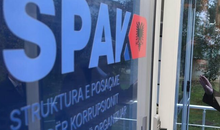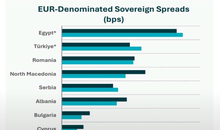
 Flash News
Flash News
Drenova prison police officer arrested for bringing drugs and illegal items into cell
Lavrov: NATO is risking self-destruction with new military budget
Kurti and Vučić "face off" tomorrow in Skopje
Construction worker dies after falling from scaffolding in Berat
The prosecution sends two Korça Municipality officials to trial

by Sali Berisha
The long-awaited meeting on February 27, 2023, in Brussels to sign the Franco-German Agreement, the EU's basic Agreement for relations between Kosovo and Serbia, ended with/without success or the glass half empty/full. The Agreement for which the two parties have declared acceptancy was not signed.
But, unlike other meetings at the end of this last one, there were only soft accusations between the parties. So, after the meeting, their tones were calm and composed, which was positive.
After the meeting, Prime Minister Kurti stated that both parties agreed with the document's content and that he was ready to sign the Franco-German plan, but President Vucic refused.
President Vucic stated that Prime Minister Kurti refused to discuss the Association of Municipalities with a Serbian majority in Kosovo.
The next meeting will occur in Brussels in the second half of March.
The Kosovo-Serbia agreement is significant for the relations between the two countries and our entire region. This Agreement does not provide a final solution to the problems between the two independent neighboring countries. Still, its implementation makes it a win-win agreement for the parties, which benefits Kosovo, Serbia, and the region.
For this reason, for the next meeting not to have the same result as the one on February 27, it will be necessary to work on eliminating the existing obstacles to signing this Agreement and its annex.
From the position and statements of the Serbian side, Prime Minister Kurti's refusal to discuss the Association was an obstacle to signing the Agreement on their part. And this, at first glance, passes the responsibility to the Kosovo authorities.
In my opinion, no free country can stop the creation of associations of citizens, regardless of political beliefs, religious beliefs, or racial and ethnic affiliation, with the only condition that the country's Constitution establishes them. In a free country, this right is undeniable.
The USA repeatedly expressed itself for the Association following the Constitution of Kosovo. Prishtina should commit to such an obligation.
But the truth is that Belgrade does not claim and would not accept an association within the constitutional framework of Kosova. We should have no illusions that Serbian president Aleksandër Vučič wants a supra-constitutional ethnic-nationalist association, which de facto and de jure guarantees the extension of the Serbian state in Kosovo, the extension of Serbo-Magnia in the region. Such an association that would embody the spirit of the annexationist preamble of the Serbian Constitution, which stands like the sword of Damocles over this Agreement, is unacceptable and dangerous for Kosova and the entire region. Anyone defending or supporting such an association should not forget that the barrel powder in the region is the Serbian ultra-nationalism and that the Serbian minority in Kosova enjoys greater political rights than any other minority in Europe.
In conclusion, the Agreement between Kosova and Serbia is not and cannot be held hostage by the Kosovar authorities, which must accept associations that fully respect the norms of the excellent Constitution of Kosovo drawn up by the international community, which fully guarantees freedoms and rights of the citizens of Kosova and the minorities in this country. The finalizing of the Agreement cannot happen by applying pressure based on the principle of locus minoris resistentiae to Kosova so that the latter kicks the Constitution and the decision of its Constitutional Court.
The Franco-German Agreement is on hold, and the fact that it could be held hostage by Serbia petrifies me. Belgrade not only did not accept the recognition of Kosovo in the Agreement nor the removal of the annexationist preamble from its Constitution but seeks to impose on Kosova a supra-constitutional ethnonational association of municipalities with a Serbian majority in this country, which would be a severe threat to the stability of Kosova, the region and a dangerous reward for Serbian ultra-nationalism. Therefore, Belgrade's renunciation of the demand for a supra-constitutional association in Kosova is the only way to achieve the signing and implementation of the Franco-German plan, which seems to enjoy full support from both countries as a win-win agreement and which is supported by the EU, the US, and the region.
Latest news



Second hearing on the protected areas law, Zhupa: Unconstitutional and dangerous
2025-06-30 22:18:46



Israel-Iran conflict, Bushati: Albanians should be concerned
2025-06-30 21:32:42

Fuga: Journalism in Albania today in severe crisis
2025-06-30 21:07:11
"There is no room for panic"/ Moore: Serbia does not dare to attack Kosovo!
2025-06-30 20:49:53

Temperatures above 40 degrees, France closes nuclear plants and schools
2025-06-30 20:28:42
Lavrov: NATO is risking self-destruction with new military budget
2025-06-30 20:13:54
Turkey against the "Bektashi state" in Albania: Give up this idea!
2025-06-30 20:03:24

Accused of sexual abuse, producer Diddy awaits court decision
2025-06-30 19:40:44



Kurti and Vučić "face off" tomorrow in Skopje
2025-06-30 18:44:12
Tourism: new season, old problems
2025-06-30 18:27:23


Construction worker dies after falling from scaffolding in Berat
2025-06-30 17:51:44




Almost free housing: East Germany against depopulation
2025-06-30 16:43:06

Hamas says nearly 60 people killed in Gaza as Trump calls for ceasefire
2025-06-30 16:14:15
Drownings on beaches/ Expert Softa: Negligence and incompetence by institutions!
2025-06-30 16:00:03


European ports are overloaded due to Trump tariffs
2025-06-30 15:30:44
The prosecution sends two Korça Municipality officials to trial
2025-06-30 15:19:54

Lezha/ Police impose 3165 administrative measures, handcuff 19 drivers
2025-06-30 14:55:04
Young people leave Albania in search of a more sustainable future
2025-06-30 14:47:52
Record-breaking summer, health threats and preventive measures
2025-06-30 14:36:19


Constitution of the Parliament, Osmani invites political leaders to a meeting
2025-06-30 14:07:54

Heat wave 'invades' Europe, Spain records temperatures up to 46 degrees Celsius
2025-06-30 13:42:02
Accident in Vlora, car hits 2 tourists
2025-06-30 13:32:16

Kurti confirms participation in today's official dinner in Skopje
2025-06-30 13:03:27

Fight between 4 minors in Kosovo, one of them injured with a knife
2025-06-30 12:38:45

Report: Teenage girls the loneliest in the world
2025-06-30 12:20:40
Commissioner Kos and Balkan leaders meet in Skopje on Growth Plan
2025-06-30 12:07:59
Wanted by Italy, member of a criminal organization captured in Fier
2025-06-30 11:55:53
Hundreds of families displaced by wave of Israeli airstrikes in Gaza
2025-06-30 11:45:17

Zenel Beshi: The criminal who even 50 convictions won't move from Britain
2025-06-30 11:23:19
A new variant of Covid will circulate during the summer, here are the symptoms
2025-06-30 11:14:58


"Partizani" case, trial postponed to July 21 at the Special Court
2025-06-30 10:41:05
Uncontrolled desire to steal, what is kleptomania, why is it caused
2025-06-30 10:30:08
Requested change of security measure, hearing for Malltez postponed to July 7
2025-06-30 10:24:32


Output per working hour in Albania 35% lower than the regional average
2025-06-30 09:54:35


The trial for the "Partizani" file begins today
2025-06-30 09:27:57
22 fires in the last 24 hours in the country, 2 still active
2025-06-30 09:21:28
How is the media controlled? The 'Rama' case and government propaganda
2025-06-30 09:13:36
German top diplomat: Putin wants Ukraine to capitulate
2025-06-30 09:00:07
Foreign exchange, how much foreign currencies are sold and bought today
2025-06-30 08:44:38
Chart/ Sovereign risk for Albania from international markets drops significantly
2025-06-30 08:26:38
Horoscope, what do the stars have in store for you?
2025-06-30 08:11:44
Clear weather and passing clouds, here is the forecast for this Monday
2025-06-30 07:59:32
Morning Post/ In 2 lines: What mattered yesterday in Albania
2025-06-30 07:47:37
Milan make official two departures in attack
2025-06-29 21:57:23
6 record tone
2025-06-29 21:30:46
4-year-old girl falls from balcony in Lezha, urgently taken to Trauma
2025-06-29 21:09:58


Assets worth 12 million euros seized from cocaine trafficking organization
2025-06-29 19:39:43
Fire in Durrës, Blushi: The state exists only on paper
2025-06-29 19:17:48

Fire endangers homes in Vlora, helicopter intervention begins
2025-06-29 18:27:51
France implements smoking ban on beaches and parks
2025-06-29 18:02:08
England U-21 beat Germany to become European champions
2025-06-29 17:42:49
Trump criticizes Israeli prosecutors over Netanyahu's corruption trial
2025-06-29 17:08:10
Street market in Durrës engulfed in flames
2025-06-29 16:52:57

UN nuclear chief: Iran could resume uranium enrichment within months
2025-06-29 16:03:24
Albanian man dies after falling from cliff while climbing mountain in Italy
2025-06-29 15:52:01

Another accident with a single-track vehicle in Tirana, a car hits a 17-year-old
2025-06-29 15:07:15
While bathing in the sea, a vacationer in Durrës dies
2025-06-29 14:54:01
Sentenced to life imprisonment, cell phone found in Laert Haxhiu's cell
2025-06-29 14:26:40
77 people detained in protest, Vučić warns of new arrests
2025-06-29 14:07:46

